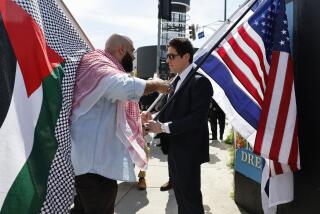U.S. Peace Activists Regard Bosnia Deployment Warily
- Share via
NEW YORK — Although no one appears to be planning large-scale protests--like those that tore the nation apart during the Vietnam War with cries of “Out now!”--President Clinton’s deployment of American troops to Bosnia is being watched apprehensively by peace activists.
“Sadly, there are times when there is no answer except time,” the War Resisters League said in a recent statement issued here. “The people of the Middle East are finally beginning to make peace. The forces of Northern Ireland are finally beginning to make peace. Outside military force did not help.”
Activists fear that the problems in Bosnia-Herzegovina are so deeply rooted that no quick fix will work.
“The U.S. will not be seen as neutral. Serbs will view NATO forces as an occupation. Violence is inevitable,” the War Resisters League said. “The United States has no national interest in Bosnia. Bosnia is a European problem, and if Europe cannot solve it, it can’t be solved. The United States has no business dispatching forces to enforce a peace agreement.”
The American Friends Service Committee also does not endorse a large-scale U.S. military presence in the troubled Balkans, where U.S. troops will be part of a 60,000-soldier North Atlantic Treaty Organization force. But with such a commitment all but inevitable, officials of the Philadelphia-based group said emphasis should be on maximizing the possibility of peace.
“Our primary concern is this NATO force not act in any way as a partisan force, and that NATO learn the art of peacekeeping,” said David Gracy, director of the organization’s peacekeeping project. “We are particularly worried about the way in which the agreement has been written and the pressure that Mr. Dole [Republican Sen. Bob Dole of Kansas] has been putting on the president to emphasize the training and arming of the Bosnian [government] forces.
“We think that if we really are talking about peacekeeping here, we have to be talking about building down, disarmament, and not this notion . . . of achieving some kind of parity by building up one side.”
Joanne Landy, president of the New York-based anti-war group Campaign for Peace and Democracy, said that her organization has not taken a formal stand on the deployment but that she believes most members oppose it.
“As an organization, we were in favor and are in favor of lifting the arms embargo,” Landy said. “From the beginning of the disintegration of Yugoslavia, there was no interest in defending the principles of democracy. . . . This so-called peace settlement that we are being asked to send troops to enforce is a recipe for a carve-up of Bosnia after a decent interval.”
Officials of Peace Action in Washington said their membership is divided.
“Peace Action is against the use of militarism and armed force as yielding a permanent solution,” said Fran Teplitz, director of the group’s education fund. “At the same time, given this situation, we applaud any action that promotes a cease-fire and negotiations. We hope it will bring the profound reconciliation that is needed.”
Unlike some other groups, the Fellowship of Reconciliation, a pacifist organization based in Nyack, N.Y., supports the deployment.
“We feel this is the best option for peace at this point,” said Douglas Hostetter, the international secretary of the group. “We are very aware this peace agreement ratifies an ethnic separation that was brought about by war and atrocities of enormous proportions. But at this point we agree with the signers of the peace accords that it is time to stop the killing and start pursuing through political and judicial means a more just settlement.”
More to Read
Sign up for Essential California
The most important California stories and recommendations in your inbox every morning.
You may occasionally receive promotional content from the Los Angeles Times.













